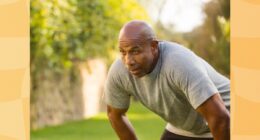A top doctor has revealed a simple 10-second health test that could give you an idea of how long you might live. The ’10s OLS’ test involves standing on one leg for 10 seconds and is said to reveal important information about your physical condition and potential life expectancy.
A study found that 348 individuals, primarily over 70s and people with diabetes, were unable to balance on one leg for 10 seconds.
After a follow-up period from 2008 to 2020, it was revealed that 17.5 percent of these individuals passed away compared to only 4.6 percent who passed the balance test.
It suggested that those unable to maintain balance for 10 seconds had an 84 percent higher likelihood of fatality.
The researchers inferred that struggling with balance could imply deterioration in muscle strength which increases risk of falling and may signify underlying health risks.
Dr Claudio Gil Araujo said: “While it is known that good levels of balance are relevant for many daily life activities, there is considerable evidence that loss of balance is also detrimental for health and that some exercise interventions may improve balance.”
Balancing exercises include lifting your heels off the ground and holding this pose for three seconds, then lowering again.
Another involves placing one foot directly in front of the other heel to toe and maintaining this for 10 seconds before switching feet.
A simple marching activity can enhance eye-body coordination, and regular walks with yoga routines can also yield positive results.
Scientists say a simple ten-second balance test could show if older people are at risk of dying.
Dr Setor Kunutsor explained: “The one-legged stance test has been used to assess balance over the last five decades, but it is not routinely employed in the clinical examination of middle-aged and older individuals. A major reason for this is the lack of data on its relationship with adverse outcomes such as falls and mortality.
“The current findings suggest the 10-second one-legged stance is a potential practical tool that could be used in routine clinical practice to identify middle-aged and older individuals at high risk of death. We encourage researchers with access to these data to publish their findings to confirm these results.”
This article was crafted with the help of AI tools, which speed up the Daily Express editorial research. A Daily Express editor reviewed this content before it was published. You can report any errors here









